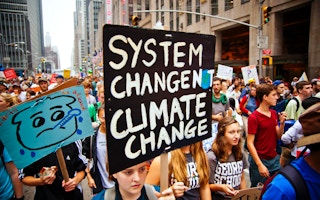The Green Climate Fund, set up to channel billions of dollars to help developing nations tackle climate change, must operate more efficiently, with greater political attention needed to make that happen, the United Nations’ climate chief said on Thursday.
The fund’s July board meeting at its South Korean base - which ended in disarray after its executive director resigned and the board failed to reach key decisions - was “a cause of concern”, Patricia Espinosa said in an interview.
“We need to overcome… the obstacles that did not allow the board to deliver on the very important work it had to conclude,” she told the Thomson Reuters Foundation.
The fund is independent, although it was established by the U.N. climate talks as a key vehicle for climate finance.
Espinosa said she did not have a specific formula or suggestions for its reform.
“What I think is indispensable is to get a higher level of attention, a political level of attention, to make this institution work,” she said, urging finance ministries to get involved in the discussions.
The Green Climate Fund (GCF) has been beset by arguments between rich and poor nations about how and where to invest the $10.3 billion it was promised by wealthy governments in 2014.
Tensions have also risen since U.S. President Donald Trump - who plans to pull the United States out of the Paris climate accord - indicated he would not deliver a remaining $2 billion of $3 billion promised to the GCF by his predecessor.
The fund’s deputy executive director, Javier Manzanares, said on Wednesday the last board meeting had been “somewhat of a setback”.
“But GCF still has a huge role to play, and we are already delivering,” he told Pacific government officials in Micronesia.
So far, the GCF has committed $3.7 billion to 76 projects - from boosting energy efficiency in Brazilian cities to helping Maldives islanders manage water shortages in a warmer world.
Observers have suggested reducing the number of GCF board members - now 24 - and devolving to its secretariat decisions on which projects should be funded.
Ben Bartle, a senior climate finance expert with consultancy E Co., said the fund was at a “critical juncture” where it needed to streamline its processes, become more transparent, and disburse money for projects faster.
Espinosa, who heads the U.N. climate change secretariat, said the fund - which began making investment decisions only in 2015 - was still very young.
It is also grappling with an innovative decision-making model that gives developed and developing countries an equal say, she added.
But she expressed high hopes it would “get back to work as soon as possible” at its next meeting in October.
The board should review the pipeline of projects it did not consider in July, she added, and define a process to start replenishing its coffers - another area of controversy.
“
What I think is indispensable is to get a higher level of attention, a political level of attention, to make this institution work.
Patricia Espinosa, executive secretary,United Nations Framework Convention on Climate Change (UNFCCC)
Building trust
Should the fund not advance on those issues before the next annual U.N. climate conference in December, where countries are due to agree guidelines to implement the Paris Agreement, “it will impact on the general atmosphere”, she said.
Assuring developing states they will get the climate change funding they need to reduce emissions and adapt to more extreme weather and rising seas in line with their national plans “is a very central element” of the Paris pact, said Espinosa.
Rich governments have promised to mobilise $100 billion per year in climate finance for vulnerable countries by 2020, but have not set out a clear pathway to reach that goal.
Climate financing from the world’s six largest multilateral development banks - a major source of funding - rose to $35.2 billion in 2017, up 28 percent on 2016, they said in June.
The same projects attracted an additional $51.7 billion from other sources of financing last year, they noted.
Espinosa said the negative messages from the Trump administration on the U.N. climate change process, and its unwillingness to contribute money, were an element “that is not sending the signals to build up the trust that we need”.
But other countries had stayed committed to the global accord because it was in their own interests, she said.
“It’s a question of how valuable is this agreement for the future of humanity,” she said.
This story was published with permission from Thomson Reuters Foundation, the charitable arm of Thomson Reuters, that covers humanitarian news, women’s rights, trafficking, property rights, climate change and resilience. Visit http://news.trust.org)










